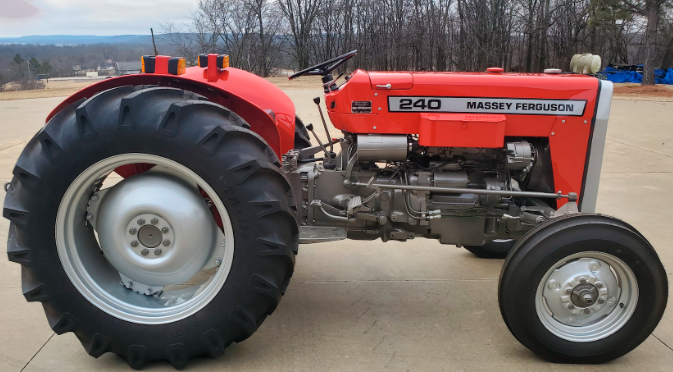If you’ve been looking for Massey Ferguson 240 issues and solutions, you’ve found the correct place. After confirming the details with multiple Massey Ferguson representatives, we can confidently present this information to you.
Let’s talk about the Massey Ferguson 240 Problems and their solutions. It’s hard to find full information online. Thus, we advise you to conserve energy and time. To simplify your search, we’ve gathered Massey Ferguson 240 Problems information. let’s get to the main topic.

Massey Ferguson 240 Problems And Their Solutions
Here is a list of Massey Ferguson 240 Problems and how to fix them. Which are as follows.
| Massey Ferguson 240 Problems | Solutions |
| (1) Diesel Breakdown |
|
| (2) Electrical Issues |
|
| (3) Diesel Leaking |
|
| (4) Overheating Motor |
|
| (5) Steering Wheel Issues |
|
| (6) Dull Blades |
|
Above we have briefly seen some problems and their solutions, now let us understand them in detail.
(1) Problem 1: Diesel Breakdown
Check fuel filters first when your diesel tractor won’t start. Dirty filters restrict vents and prevent gas from accessing the engine through the tank.
Solutions
If the filter is the source of the issue, cleaning or replacing it may help to resolve it. Sending the old battery to a professional for analysis is a good idea before buying a new one.
If the issue is with the Filter, clean or replace it to potentially resolve the problem. Send the old battery to a professional for assessment before acquiring a new one. Repairing the fuel injection system on your own is difficult. If you attempt to fix it yourself, it could cost you more over the long term.
(2) Problem 3: Diesel Leaking
After the engine is turned off, diesel fuel occasionally spills. Typically, these leaks only occur when the tractor is in operation. Leaky head gaskets or sump gaskets may also result in oil leaks. A minor hole in the gasoline tank might result in unavoidable fuel leakage. As the gasoline tank rots over time, gets older, or becomes malfunctioning as time passes, fuel leaks begin to develop.
Solutions
Examining the oil level is a must if your vehicle’s engine is dripping oil. If the engine seems overfilled, empty it until the dipstick registers the proper level. Since a secure tank is preferable than one that might catch fire, it may be necessary to entirely replace an ageing oil tank.
(3) Problem 4: Overheating Motor
Problems with coolant, radiator failures inadequate engine oil, and malfunctioning temperature gauges are all typical reasons for tractor heat. The temperature of the engine of the tractor should be in the range of 150-180 Degrees Fahrenheit.
When the engine reaches 220 degrees Fahrenheit, the temperature sensor’s warning light will on. Examine the temperature gauge To determine whether the indication is not illuminated.The cooling system needs to be fixed, and the engine is operating hot if the gauge moves towards the hotter part of the scale after a few hours of driving.
Solutions
Because radiators cause the majority of problems arising from an overheated tractor, it is crucial to wash the radiator if it’s dirty. Dirt may hinder airflow, making it difficult for the radiator to work. Let the engine cool entirely if there isn’t adequate coolant in the radiator.
Remove The radiator cap once the engine has cooled and verify the coolant inside to make sure it is at the proper level. The radiator coolant should be checked often, and if low, more should be added.
(4) Problem 6: Dull Blades
If grass isn’t mowed efficiently, mower blades may dull. Time may dull blades. Additionally, they are ineffective The dull blades of mowers could sometimes make the mower stop when grass is pushed over the blades, which makes it more challenging for engines to turn the crankshaft.
Solutions
Blades should, on average, be sharpened at least twice a year in order to increase performance. If securely removing the blade is not feasible, this can be accomplished with a file or by contacting a repair shop for tractor help. The performance of the blades may be considerably improved by just sharpening them.
What Majority of the Users Feel?
The Massey Ferguson 240 is well-liked, having an average rating of 4 on most online forums. While some customers have experienced electrical and mechanical concerns, they have also claimed on Tractor By Net that these problems are fixable. Overall, the Massey Ferguson 240 is regarded as a capable machine
Massey Ferguson 240 Problems FAQs

(1) What engine is in a Massey Ferguson 240?
Ans. The Company offered both four-wheel drive and two-wheel drive versions of the MF 240. The Perkins diesel 2.5 L 3 cyl engine could generate 46 HP @ 2000 RPM. This motor had a coolant capacity of 9.8 litres, a bore/stroke of 91.2 by 128 millimetres, and a fuel capacity of 47.7 litres.
(2) What is the coolant capacity of a Massey Ferguson 240 engine?
Ans. 9.8 liters or 10.4 quarts.
(3) What is the price of the Massey Ferguson 240?
Ans. $7,800 to $7,900.
(4) When was Massey Ferguson 240 first manufactured?
Ans. The production began in 1979 before being stopped in 1999.
Final Words
To sum up the issues with the Massey Ferguson 240, that is all there is to know. nonetheless, please use the space below to ask any questions you may have concerning this subject. As soon as we can, we will get back to you regarding your inquiry.
I wrote this essay to answer all of your questions concerning the issues with the Massey Ferguson 240.
The following information will enlighten you concerning the issues experienced by the Massey Ferguson 240.
Commercialvehicleinfo.com has all the details you need.
